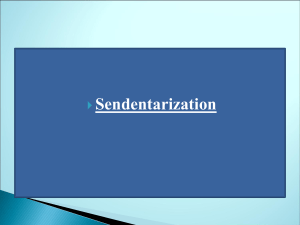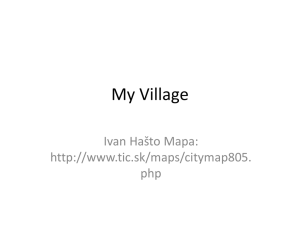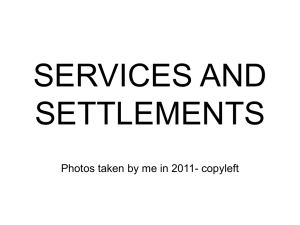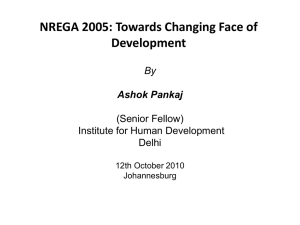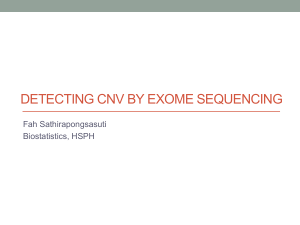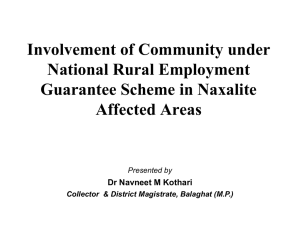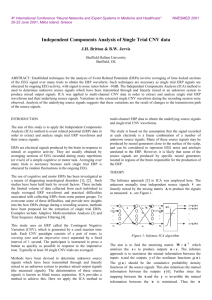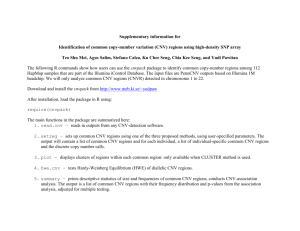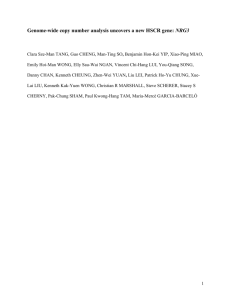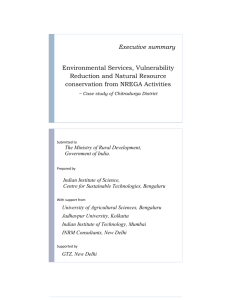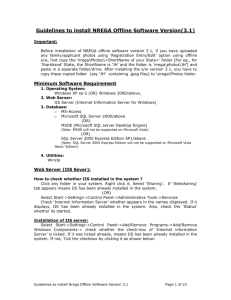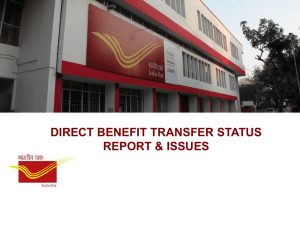Presentation - Doccentre info
advertisement
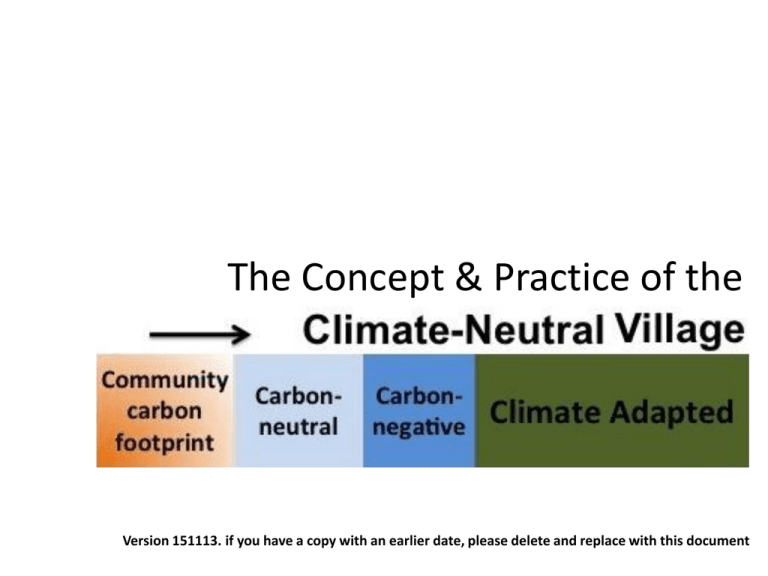
The Concept & Practice of the Version 151113. if you have a copy with an earlier date, please delete and replace with this document Since 2010, the Climate Vulnerable Forum has been warning the world of the effects of Climate Change For more information: http://daraint.org/climate-vulnerabilitymonitor/climate-vulnerability-monitor-2010/download-thereport/ Yet, internationally, it’s business as usual • The 1st Commitment Period under the Kyoto Protocol ended in Dec 2012. • Major economies – Canada, Japan, Russia, New Zealand – did not sign up for the 2nd Commitment Period (2013-2020) • The EU and Australia are the only major economies left with (very modest) emission targets • The Doha Amendment (governing the 2013-2020 targets) has only been formally accepted by: Barbados, United Arab Emirates & Mauritius! It is NOT in force! Will it ever be? Climate-Neutral Village • CNV is a structured process to raise financial resources for climatevulnerable communities. • It uses CSR funding to neutralise a community’s carbon footprint, • become CarbonNegative, and • adapt to, and cope with the effects of climate change Yet it’s more than just a 3-year intervention • The Climate-Neutral Village – is an integrated platform for village development – provides a road map for adaptation. – facilitates communities to influence and access resources from line departments, PRIs, financial institutions and NGOs to make this adaptation possible – uses external grants New Trees improved cookstoves • to neutralise its community carbon footprint through improved cookstoves and planting 50 trees per acre as hedge crops • to support 1 village development assistant to support the community to liaise with line departments, PRIs, financial institutions and NGOs, • to meet its overheads, and • to support climate advocacy, documentation, a GIS/MIS data backbone, and compliance and issuance Crop insurance sprinkler/drip Irrigation Sustainable Agriculture Recharge facilities for private borewells Community Borewells Organic/NPM cropping short-duration / drought-tolerant seeds No-Till sowing Drainage in Black Soils Farm Ponds Watershed/Tre nch-cum-Bund treatments Farmer’s Club • The community will be facilitated to access a NABARD Farmer Club or equivalent • Existing treated lands, Farm Ponds, use of short-duration seeds / drought-tolerant seed varieties, Organic/NPM cropping practices, community borewells, private borewells with recharge facilities, sprinkler/drip irrigation and crop insurance will be counted; • And, the community will be facilitated to access more of these inputs from NABARD, NREGA, Dept of Agriculture, the Dept of Watershed Development Development and the NGO itself. NRM – natural resources management 1 ton compost per acre • • Top Soil desilting sub-surface interflows and aquifer recharge • rainwater harvesting • rainwater storage • existing trees Existing trees. This is an existing resource. The community will be assisted to protect these. Combined Rainwater storage. Existing village tanks etc will be monitored, and new storage facilities proposed or recharge facilities planned so that the community internalises how critical these are to the community's survival. Focus on this will also allow the community to take steps to manage these better. Existing Rainwater harvesting structures. The community will also be facilitated to increase this capacity through NREGA, the dept of agriculture, the Watershed Development dept, and the implementing agency itself. Top soil: The community will be facilitated to access this through NREGA, and the implemtning agency. Composting: The community will be facilitated to access this through NREGA, the dept of agriculture, and the implementing agency. Livelihoods • Organised Livelihood: annual turnover/total producers*producers from village : The implementing agency will explore with households organised livelihoods such as milk production. The implementing agency will also monitor households with members engaged in non-farm livelihoods. • Livestock 1 organised/i nformal livelihood per household Livestock • Households with sheep and goats, poultry and pigs will be monitored. All households will be encouraged to keep livestock as a form of emergency savings that can be easily encashed in units or as a whole. Public Resources • social welfare benefits NREGA Kisan Credit SHG Bank Linkages Priority Sector loans • CNV will periodically count all households with priority sector loans, who are members of women’s SHGs, farmers who are accessing Kisan Credit cards, households who are accessing NREGA work as employment and to build NRM assets on their lands, and households who have accessed all eligible social welfare benefits. The implementing will also facilitate eligible households who have not accessed these schemes to do so. Climate education • Equitable Public Climate Policies Climate Change awareness events Structured Climate Change education environment group • • The implementing agency will organise an environment group comprising school children and youth to undertake structured Climate Change education. The environment group will be encouraged to hold periodical Climate Change awareness events. The environment group will also make presentations to the govt to recognise its Climate Change efforts, as well as its efforts to become climate-adapted. All households in a woni/street will be organised by the implementing agency into female and male groups. Community Organisation VCCDC Village Climate Change & Development Committee 1+1 representatives of these gender groups will be selected unanimously by each street group and seconded to the Village Climate Change & Development Committee. Effectively, this group will function as the representative general body of the village. Streets in older villages are traditionally caste-based. As a result all caste groups are represented, as will all religious groups. All decision-making in the VCCDC will be by consensus and in public. And because 50% of the representatives are women, gender in decision-making is institutionalised as a process. CNV: its GIS/MIS backbone makes it very accountable, transparent and very visible CNV is enabled by a small support ecology CNV Secretariat INECC Indian Network for Ethics and Climate Change - http://inecc.net Partner Networks In the absence of a Partner network, INECC will meet CNV’s networking requirements CED Akasmika Bridge Builders Centre for Education & Documentation - http://www.doccentre.net Akasmika is a private entity that provides the GIS/MIS data backbone. Bridge Builders is a private entity responsible for Compliance and Issuance http://www.bridge-builders.de SAMUHA SAMUHA is a NGO that works in North Karnataka and is the originator of CNV - http://samuha.org iSquareD iSquareD is a charitable trust that promotes social enterprises – and heads the CNV Secretariat - http://isquared.in The Climate-Neutral Village is a geographical platform for integrated and sustainable development… Climate-Neutral Villages transitioning climatevulnerable communities into climateadapted communities Climate-oriented community organisations and groups, natural resources management, sustainable agriculture, improved cookstoves, public resources: NREGA, social welfare benefits, priority sector lending (SHGs, JLGs), … … that offers the promise of Sustainable Development in a practical way that supports interested households within a community framework





